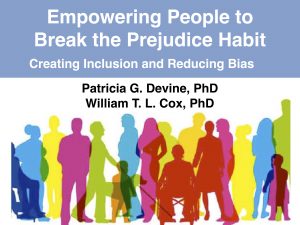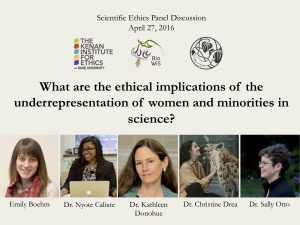On this page you will find all of the previous programming that the Duke Biology IDEA Committee has provided for the department since 2016. Events have been broken up into two categories: Invited Speakers & Workshops, and Doughnut for Diversity/Coffee Chat Events. Each event provides a brief description of what the seminar/workshop comprised of, and any helpful resources provided in association with this event. If you are curious as to what we have next on the docket, check out our Upcoming Event Page for more information!
Invited Speakers & Workshops
April 25th, 2022 – Navigating Power Dynamics in Mentoring Relationships
Brief Description: The relationships doctoral students and postdocs form with faculty mentors are critical to their academic and professional success. These relationships can also generate (for mentors as well as mentees) significant amounts of complication and stress. It is important for both mentees and mentors to acknowledge the structural limitations of academic mentoring relationship, including the “elephant in the room,” of power dynamics. This talk, which draws upon Dr. Wisdom’s coaching work with both doctoral student mentees and faculty mentors, outlines some challenges related to power dynamics, as well as strategies doctoral students and faculty can employ to feel greater confidence and agency in navigating these relationships.
2021 Inclusive Teaching Mini-Series
April 22nd, 2021 – Challenges for Students with Disabilities in Active Learning, Undergraduate Research, and the Transition to Online Instruction
Brief Description: Logan Gin presented on the efficacy of different teaching styles when teaching to people with disabilities.
March 15th–28th, 2021 – Asynchronous Screening of “Hungry to Learn”
Brief Description: The documentary “Hungry to Learn” delves into the problem of food insecurity on various campuses by following the lives of a group of students. After the two-week period to view the documentary, we followed the screening with a guided discussion.
February 22, 2021 – “Teaching Anti-Racism in a Biology Classroom”
Brief Description: Andrea Ruby, a biology teacher in the Durham Public Schools, presented on how she engages with anti-racism work in her biology classroom, specifically through the use of the book “The Immortal Life of Henrietta Lacks.”
November 16th, 2020 – Inclusive Teaching Practices with Project Biodiversify
Brief Description: We worked with the leaders of Project Biodiversify to organize and lead a virtual seminar on inclusive teaching practices in Biology classrooms. Project Biodiversify is an external organization, led by Dr. Ash Zemenick, that creates an online space to promote diversification and inclusivity in STEM classrooms. The virtual seminar included practical teaching methods on identifying and using diverse scientist role models, navigating the oversimplification and omission of identities in science, and how to discuss these topics with students inclusively. The event had >60 attendees that included professors, staff, post-docs, and graduate students from the Biology and Evolutionary Anthropology Department.
2020 Diversity and Inclusion Mini-Series
January 13th, 2020 – Working Towards Active Listening to Build Cultural Understanding
Brief Description: Often times, we listen for responding, rather than for understanding. However, listening to actively understand others is central if we aim to understand other cultural perspectives and work towards equitable and inclusive solutions. To increase our competency along these axes, Dr. Darla Deardorff of the Social Science Research Institute designed and led a workshop that requires active rather than passive listening.
Useful Resources Provided:
Story Circles – An Intercultural Competencies Development Tool
January 27th, 2020 – Bystander Intervention: Addressing Harassment & Bias at Work
Brief Description: Harassment and bias is a persistent and pervasive problem in academic medicine and science (Sexual Harassment of Women: Climate, Culture, and Consequences in Academic Sciences, Engineering, and Medicine – National Academies 2018), and Duke is no different. Data from the recent survey of Duke faculty and staff demonstrates the need to combat harassment, bias, and incivility. A powerful method of combating these incidents is bystander training. This interactive presentation, led by Ada Gregory of Duke University’s Kenan Institute for Ethics, will introduce how to:
• Effectively respond when harassment, callous behavior or insensitive remarks occur
• Engage parties who have caused harm to others in a restorative way
• Model bystander interventions in your areas to create a culture where harassment and bias incidents are less likely to occur or re-occur
February 3rd, 2020 – An IDEAL(S) Approach to Duke Biology
Brief Description: Issues of Diversity and Inclusion clearly extend beyond the Duke Biology Department to the university and academia as a whole. Duke University has increased their efforts to promote diversity and inclusion over the past five years; perhaps the most visible of these is the Inclusion, Diversity, Equity, Advancement, and Leadership in the Sciences (IDEALS) Office directed by Dr. Johnna Frierson. Dr. Frierson will briefly explain the core concepts of the IDEALS office before discussing what this office can do for the Biology department.
September 11th, 2019 – Diversity and Inclusion Breakfast Q&A with Chelsea Specht
Brief Description: Chelsea Specht, Dean for Diversity and Inclusion at the Cornell College of Agriculture and Life Sciences, sat down with graduate students, postdocs, faculty, and staff of the Duke Biology Department to discuss ways to improve the recruitment, admission, and retention of students from diverse backgrounds. Dr. Specht drew on both her experiences as Dean and a Faculty Equity Advisor at UC-Berkeley, as well as her role in facilitating the Cornell University Diversity Preview Weekend.

March 25, 2019 – Building Cultural Competency
Brief Description: Dr. Seun Omasu of the International House lead this workshop consisting of a condensed version of a Duke’s Intercultural Skills Development Program (ISDP). In doing so, Dr. Omasu helped participants understand how our own cultural biases craft lenses in which we perceive the world, and what we can do to build cultural competency, or a greater understanding and acceptance of people with different worldviews.
Useful Resources Provided:
PDF of Guidelines for Multicultural Collaboration (link here)
Discussing Culture Value Models (link here)
Punnett, B.J. International Perspectives on Organizational Behavior and Human Resource.
https://www.hofstede-insights.com
April 1, 2019 – Reducing Bias in Evaluation Methods
Brief Description: Dr. Cisco Ramos, the Assistant Dean for Assessment and Evaluation in the Duke Graduate School, helped design interactive exercises that engaged participants about their personal beliefs on the efficacy of different evaluation metrics such as the GRE and GPA, how they define “success”, and the validity of using current metrics of evaluation to prioritize candidates for faculty hires. From there, participants were challenged to think about how metrics can be modified to be more equitable across scales.
Useful Resources Provided:
Reducing Bias in Evaluation Handout – Tips and Further Information
April 15, 2019 – Guest Seminar Speaker Dr. Bryan Dewsbury: ‘The Promise and Practice of Inclusive Pedagogy’
Brief Description: Dr. Bryan Dewsbury, one of the premier scientists in tackling questions of inclusivity and diversity in STEM fields, served as the keynote speaker for this diversity mini-series. Dewsbury discussed his recent work, which focuses on questions pertaining to bias, identity constructs, and relationships to examine how the perceptions that students develop of the world and others affect scientific engagement and future career/academic success.
Useful Resources Provided:
Dewsbury’s website, which features more information on inclusive pedagogy and a list of other issues regarding the delivery and practice of education. Link is provided here
A recent paper by Dr. Dewsbury on novel methods to retain underrepresented minority students in STEM is provided here.

April 23rd, 2018 – Empowering People to Break the Prejudice Habit Brief Description: Dr. Devine and Dr. Cox, two scientific leaders in the study of stereotyping and implicit biases, developed and empirically tested this training designed to break the “prejudice habit.” The intervention that Devine, Cox, and their team designed, called the Prejudice Habit-Breaking Intervention, teaches participants about the concept of unintentional bias, its origins, and how to become more aware of it personally. After being introduced to these concepts, participants are taught a number of strategies for overcoming their unintentional biases. This training was the first and remains the only intervention that has been shown to produce long-term changes in implicit bias.
Useful Resources Provided:
Implicit Bias – A Training to Break the Prejudice Habit
UW-Madison Lab Uses Scientifically Proven Method for Overcoming Unconscious Bias
April 27th, 2016 – What are the Ethical Implications of the Underrepresentation of Women and Minorities in Science?

November 3, 2017- Disability is Diversity Workshop
Brief Description: Members of the Student Disability Access Office (SDAO), alongside the Diversity Committee, presented how disability should not be viewed strictly as a limitation, but as a means to bring novel perspective into realms of scientific discussion.
Useful Resources Provided:
Architecture for people with deafness [Vox – Youtube]
What it feels like to be autistic, interview with Temple Grandin [CNN – Youtube]
NPR Interview with Geerat Vermeij
What I’ve learned from my learning disabilities, by Collin R. Diedrich [Science Careers]
Self-advocacy resources for North Carolina
Time management strategies
Executive function problems
October 20, 2017 – Duke Biology P.R.I.D.E. Workshop
Brief Description: Run by the Center for Gender and Sexual Diversity (CGSD), this training focused on “increasing awareness of issues impacting those with marginalized sexual orientations, gender identities and gender expressions”, and was specifically tailored to the Biology department. The training is designed to equip individuals with helpful tools to assist them with responding to and dismantling cissexism and heterosexism at Duke and beyond.
Useful Resources Provided:
P.R.I.D.E Training from the Duke CSGD
Doughnuts for Diversity and Coffee Hour Chats
Doughnuts for Diversity (D4D) and Coffee Chats dually serve as a check-in with members of the community and a forum to discuss relevant issues regarding diversity and inclusion on campus. Coffee and doughnuts (or other snacks) are provided to help facilitate the discussion! Below are the dates for previously held events and a brief description of the primary focus for each discussion.
April 20th, 2023 – This safe space coffee hour served as a general check-in with the communtiy and to discuss issues grad students felt regarding structure of the department
April 6th, 2023 – This safe space coffee hour reignited small-space conversations across grad students to discuss issues within the department, which hadn’t formally been present since the start of the 2020 pandemic.
October 30th, 2019 – This doughnuts for diversity event served to bridge conversations about actionable policies that the Biology Department can take to increase diversity of the graduate community, especially in regards to recruitment, evaluation, and retention.
February 5th, 2019 – Discussions were held surrounding the professor in the Biostatistics Department who urged students not to speak their native language in the halls. Focus was on making sure that students from all nationalities could feel open and comfortable within the biology department. This D4D was followed up by the Building Cultural Competency Event (see above) which gave practical guidelines to assess different cultural biases and how to build cultural competency within the department.
March 1 & 9, 2018 – These workshops were designed to brainstorm actionable goals and changes for the department. In particular, assessment of previous materials and potential introduction of new material distributed by the Diversity Committee, inclusion efforts for international and non-Christian students (especially in regards to planned events in the department), how to best increase diversity both in the classroom and our graduate program, and how to best assist minorities who may want anonymity were some of the central foci of this D4D.